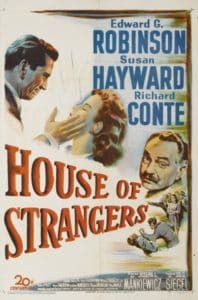What a wonderful surprise House of Strangers was to view recently. Sadly, and without researching the movie first in the slightest, I made the entirely incorrect assumption that if would be yet another of Edward G. Robinson’s enjoyable, if sometimes predictable, gangster films of the era. Now astute afficionados will realize that House of Strangers is a 20th Century Fox film, so perhaps associating Robinson’s by default with his long-time studio Warner Brothers was yet another lurid lapse of reasoning.
Robinson here isn’t the stereotypical gangster he is best know as portraying, but his portrayal of family matriarch Gino Monetti does have some thuggery of sorts. Although never explicitely stated, it is presumed that Gino is a first generation American who has an extremely entrepreneurial spirit. He has worked hard and risen from the owner of a barber shop to the head of his very own bank. Of his four sons, three of them are in the family business with their father Gino with the fourth, Max (played by Richard Conte) being an attorney who happens to have office space in the bank.
As much as he is motivated by money, Gino keeps his feet firmly rooted in his Italian heritage, listening to Italian opera at top volume and hosting an extravagant family spaghetti dinner every Wednesday night.
But there is a darker and slightly more menacing side to Gino as well: he taunts and demeans the three boys who work for him in the bank. One is perpetually called “dumbhead” and another has his salary capped at $65 a week. Still another (or it could be one of the above as they all blur together) is tasked with driving him around and scrubbing his back in the tub. This tub scene is oddly reminiscent of a similar scene in 1948’s Key Largo. Needless to say, those kids must have surely loved the idea of inheriting that bank to put up with such nonsense.
Max Monetti (Richard Conte) is the fourth son- the lawyer. Max alone among the four Monetti sons seems to have his father’s favor. When Max insists on kissing his fiance at dinner- over his own mother’s objections due to the presumed inappropriateness of such an act- Gino comes to his son’s defense. When Max wanders still further in having a rather open affair with Irene Bennett (Susan Hayward), Gino again comes to the support of his son. Even those spectacular Wednesday night dinners are put on hold until a tardy Max arrives. It is clear that Max is the heir presumptive, and everyone knows it.
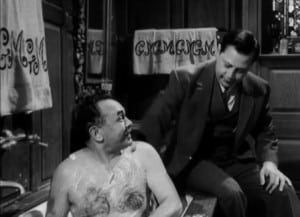 But then things start to change, as Gino begins to be questioned over matters over “his books” at the bank. It seems many of the transactions are not documented and those that are involve criminal usury. The initial questions grow into a full trial and patriarch Gino seems sure to fall. But now Max comes to the rescue and concocts a plan to win the day.
But then things start to change, as Gino begins to be questioned over matters over “his books” at the bank. It seems many of the transactions are not documented and those that are involve criminal usury. The initial questions grow into a full trial and patriarch Gino seems sure to fall. But now Max comes to the rescue and concocts a plan to win the day.
But the “Three Amigos,” as I will term the three disfavored brothers, now raise their heads in defiance. When Max attempts to roll bribe a juror, the remaining brothers sell him out, with the end result being that Gino has to sign away his bank to said “Amigos” and Max heads off to a jail sentence.
Most of House of Strangers is told in flashback, with only the beginning and end of the film being set in period after Max’s jail sentence is complete. It opens with him coming back to the bank on his release to see his brothers, who treat him with disdain and contempt. Max also revisits the family home, which is now mostly vacant as Gino passed away during Max’s incarceration.
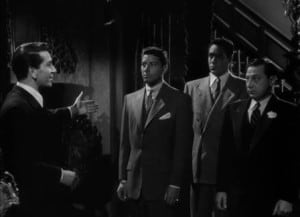 Then we break away for a flashback which lasts for most of the film, where we get the backstory and history of the Monetti family. Only at the end do we flash back to the present to a final resolution with the four brothers all together once again- though only briefly. We will avoid spoilers here, as it is a very nice twist and a great ending to the film.
Then we break away for a flashback which lasts for most of the film, where we get the backstory and history of the Monetti family. Only at the end do we flash back to the present to a final resolution with the four brothers all together once again- though only briefly. We will avoid spoilers here, as it is a very nice twist and a great ending to the film.
What we’ve neglected for the most part is to mention Susan Hayward’s role here as Max’s mistress. (We note that mistress is a bit of a misnomer here, but it seems perhaps a technicality.) She play a very important and symbolic role in Max’s rehabilitation.
House of Strangers would be termed film noir by some, but I am not sure that moniker truly fits. That said, it does have all of the key elements of the genre. Director Joseph Mankiewicz does an admirable job here in one of his lesser lauded films. Whether intentional or not, the first half of the film serves to lull you to sleep a bit and then BANG things get ramped up exponentially for the balance of the picture.
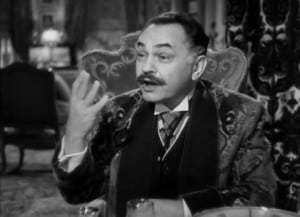 It is hard to say who is the star here, as all of the key players give a spot on performance. Robinson is Robinson pure and simple, but this is perhaps one of his most overlooked roles, and undeservedly so. Richard Conte, whom sad to say I know mostly from The Godfather more than twenty years after this film, has the most screen time and does a wonderful job as the true focal point of the picture.
It is hard to say who is the star here, as all of the key players give a spot on performance. Robinson is Robinson pure and simple, but this is perhaps one of his most overlooked roles, and undeservedly so. Richard Conte, whom sad to say I know mostly from The Godfather more than twenty years after this film, has the most screen time and does a wonderful job as the true focal point of the picture.
Susan Hayward is the curveball from hell here. On a purely superficial level, her role really matters little to the proceedings. But if you look a bit deeper- mentally squint a bit, if you will- you will find her role is critical to the success of the film- and the rehabilitation of Max himself. There is a tremendous amount of symbolism in her character, and like the other named stars, she provides an outstanding performance.
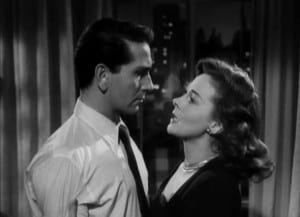 Director Joseph Mankiewicz does a stellar job in keeping the pace going with a well designed story and the overall ambiance of the film definitely has shades of noir, but calling it such may be a slight misnomer. Like most of his films, House of Strangers is extremely rewatchable.
Director Joseph Mankiewicz does a stellar job in keeping the pace going with a well designed story and the overall ambiance of the film definitely has shades of noir, but calling it such may be a slight misnomer. Like most of his films, House of Strangers is extremely rewatchable.
This was remade in 1954 in the Western genre as Broken Lance starring Spencer Tracy. That too is a worthy film, but frankly is no match for the original 1949 film. A great script, crisp direction and wonderful performances by Conte, Robinson, and Hayward make this one a hard to beat option!
